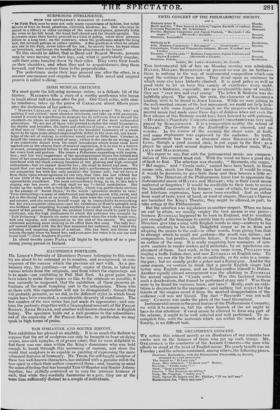IRISH MUSICAL CRITICISM.
WE must quote the following morceau entire, as a delicate bit of the blarney. MATHEWS tells a story of a worthy gentleman who began to laugh about half an hour after the jest. Our Cork critic, with simi- lar timeliness, takes up the praise of CATALANI about fifteen years after the declension of her powers. " MADAME CATALANI AT CORR.—Our occupation's gone We, who are nothing if not critical,' must abandon strictures, and take up with panegyric. Indeed it would be superfluous to measure her by criticism who is herself the standard—to whom no terms can apply but those of the most unbounded admiration. We are not of those who pretend to defirie the exact boundaries, the depths and breadths, the lights and shadows of song ; or even if we were of that race of ' little men,' who pass by the beautiful symmetry of a whole figure to fix upon some almost imperceptible defect in the shoe-tie, our know- ledge of the art of sinking in criticism would avail us little here. Catalani is herself the empress of the world of song; within it she can do no wrong ; and if she sometimes depart from the exact boundaries which lesser souls have marked out as the utmost limit of musical expression, it is to rise to a heaven of sound, unimagined before by the most sanguine enthusiast. You see it in her every look and gesture. She seems a Pythoness expanding with inspira- tion ; and her very impatience of the accompaniment shows the fulness and force of her conceptions, anxious for melodious birth ; as if every other sound interfered with the thick-coming beauties of her glowing and high-wrought enthusiasm—but we cannot describe her ; she must be heard and seen. We regret that our not having witnessed this lady's performance before prevents our comparing her with her only parallel—her former self ; but we have it from those upon whose opinions we can rely, that time has not robbed her of one tittle of the powers which have stamped her with such high and un- approachable excellence. The most extraordinary thing, to us, in this lady's singing, was her power of—what shall we say ?—lahial modulation. She
breaks up the notes with a hi rd-like facility, which was particularly obvious in the passage of ' Sweet Home,' to the words splendour dazzles in vain' 'Twas enchanting—a maze of intertwined and tangled sound, wild, sweet, and
full as the choral burst of an aviary. Her arias were the very essence of soul and science, and she seemed herself wrapt up in insensibility to everything but her own exquisite utterance—and her variations of Rode's splendid Aria
was brilliant and surprising beyond anything we could fancy even.from the report of her powers. Perhaps the greatest tribute that could be paid to her excellence, was the high enthusiasm to which the audience was wrought by Rule Britannia' Scarcely six notes were uttered when the whole house rose, with one impulse, and continued so to the end of the encore. We never
witnessed anything more striking in its effect than this song. The lady her- self seemed kindled with the fire that animated her audience, and looked the presiding and inspiring genius of a nation. She has been our dream and waking thought since we heard her, and even now her voice is in our car and in our soul."—Cork Southern Reporter.
In about twenty years PASTA will begin to be spoken of as a pro- mising young person in Ireland.


















 Previous page
Previous page